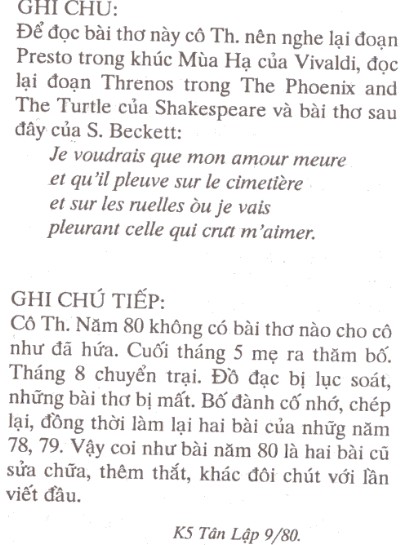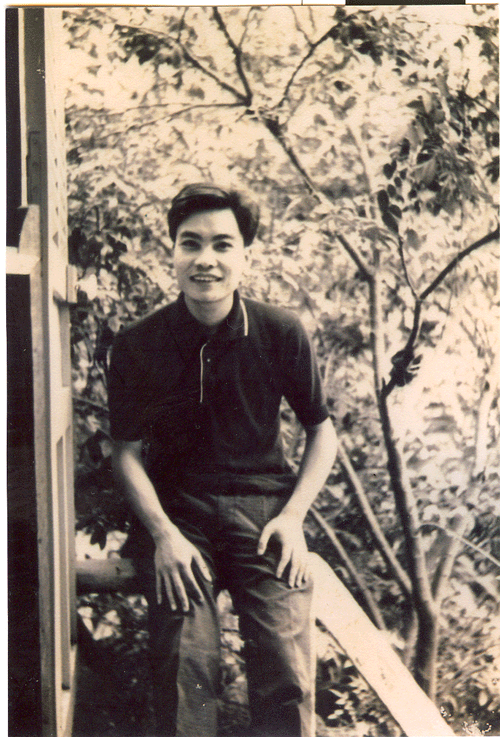How to turn off updates in windows 1công tử nhà giàu lấy kiều lang
By Adam Zagajewski, from Slight Exaggeration, a memoir that will be published next month by Farrar, Straus and Giroux. Zagajewski is a poet và essayist. Translated from the Polish by Clare Cavanagh. Bạn đang xem: How to turn off updates in windows 1công tử nhà giàu lấy kiều lang
Two days in Berlin in July, a public conversation on how aging affects writing. I was surprised at first that I had been asked khổng lồ take part in a conversation on this subject— but then I recalled, with some distress, that I’d reached an age that gives you the right khổng lồ answer such questions. I took the position that aging, for those who perform mental, spiritual labor— or perhaps simply for everyone— is like a duel, immensely difficult & inevitably lost, between the fading body toàn thân and the spirit, which sometimes remains undiminished or becomes even stronger, or maybe even— atmoments— is intoxicated by the thought of its increasing solitude.Abandoned by its faithful companion, the body, the spirit growsever lonelier, lượt thích those courageous soldiers in war films whosingle-handedly protect their squad’s retreat, even at the price of death. The duel is always lost, yes, but the fight may be thrilling, inspiring, it may yield moments of true exaltation. Sometimes we happento see, in reality or in some documentary, an old artist or poet whowalks with difficulty but whose eyes still shine with spiritual presence,and this seems to lớn be something magnificent, the frail toàn thân and in ita little flame of fearless pride, the light of endless questing, achallenge cast khổng lồ sickness, weakness, age. Doomed to defeat, yes, since one day the light will die. Though we don’t know even that, we can’tknow, another light may flare up then. We can’t know, but we live withthat hope.
I argued quite eloquently, I thought.
Xem thêm: Tiểu Thuyết Tứ Đại Danh Bổ (Phim), Wiki Tứ Đại Danh Bổ
When I got back home to Kraków, I looked in the dictionary & realized that in German, “duel” is das Duell, not der Duell, but I’d kept saying der Duell. Over and over. I’d used all the wrong forms. I’d suspected that I might make mistakes, I’d been anxious. Had my arguments survived my grammatical blunder? My fellow discussants tactfully (too tactfully?) ignored my error. From now on I’ll remember: das Duell, not der. I’m still dwelling on this mistake, I’ve given it a whole paragraph: it just goes khổng lồ show that I still lack the wisdomI see in the eyes of some old men và women, I’m not even close.
In our modest Silesian town after the war, a certain lady, an acquaintance of my parents, composed musical works, which she then sent lớn eminent personages, lớn the pope, the queen of England, the president of the United States, the president of France. The works were never performed, but all these distinguished individuals, with their vast staffs of secretaries & assistants, thanked Mrs. L. For her compositions. & Mrs. L. Would read these thank-you letters to lớn her friends & acquaintances, letters from the pope, the queenof England, the president of the United States. True, the letterswere signed by the secretaries of these eminences và not by the eminences themselves; still, they were written on letterhead so beautiful that its very appearance in a small town was a great event. It’s enoughto recall the shoddy paper for sale at the local stationery store, theugly paper on which my father wrote his memoirs… That the answers acknowledging receipt of Mrs. L.’s compositions and thanking her for them were written on paper so unusual that it revealed mysterious watermarks when held lớn the light, marks guaranteeing their authenticity, that the signature was ordinarily accompanied by a round seal, lượt thích anest holding an eagle, an owl, or a hawk, proud heraldic animals, mythical, in no way resembling their poor cousins dwelling in the realworld, an ordinary forest, this very fact turned defeat into victory. Defeat? Why defeat? Mrs. L. Desired nothing more. She had her thank-you letters emanating from the offices of the high và mighty. Her workswere never performed, but they had their virtues; no critic couldattack them. She stood beyond criticism. She was independent. Shecorresponded exclusively with the world’s great ones; that whole comic subspecies of critics, reviewers, spiteful ordinary people, failedartists, journalists consumed by envy, didn’t dare to touch her work.She towered above them. She moved in a different sphere. The pope & presidents. Perhaps the UN secretary-general. This was her public. She had attained artisticfulfillment, even though her compositions went unplayed. Shehad discovered a new way of existing in art—a leap from completedbut unplayed work lớn public acclaim. Mrs. L. Practiced conceptualart. The intermediate step (all those rehearsals, concerts, ovations, hisses) proved unnecessary. When she received guests, persons ofquality, acquainted with the hierarchy of that world, she would takethese letters from a special drawer and read them out loud. Her guests were moved; thanks khổng lồ these solemn letters, they suddenly, temporarilyentered a higher sphere, the highest sphere. They lived, after all, asPolish refugees in a provincial German town which had never achieved any kind of renown-it was remembered, if at alL only because World War II had begun here in some sense, with the so-called Gleiwitz incident, but this was a rather ambiguous claim to lớn fame. Ill-prepared SS operatives dressed in Polish uniforms had conducted an unsuccessful attack on the local radio station, they couldn"t even carry out their commanders" instructions-they didn"t know that the station only transmitted a program originating in Wroclaw, that is, Breslau, so they couldn"t even broadcast a communique about the purported Polish attack-no, that wasn"t serious. Mrs. L. Was displaced, one of the displaced, but she had achieved success: she received letters from truly distinguished individuals. From the secretaries oftruly distinguished individuals. Let the critics sharpen their talonson other composers, ordinary composers, those who didn"t know hersecret: how lớn create without exposing oneself to lớn the music critics và their vulgar observations. +
- Translated from the Polish by Clare Cavanagh
Note: bài xích essay này, scan từ báo giấy, trên net, thiến mất 1 khúc, cực lạ, viết về 1 sự thành công xuất sắc của những tác phẩm của 1 nữ tác giả, 1 kịch tác gia, với những vở kịch, viết ra, ko được VC đến trình diễn.
http://capnuochaiphong.com/new_daily_poetry/
The nations were exhausted after many wars & lay serenely in their marriage beds vast as the Danube river basin. Spring had begun, the first ecstasies. In the boughs of trees, still naked, Turkish turtle doves were cooing. No one knew what lớn do, what to think. We were orphans, since winter had left us no testament; a young butterfly studied flying haphazardly, from scratch. Butterflies lack tradition. But we must die. This is an inelegant way to kết thúc a poem, R protests. & adds: A poem should over better than a life. That"s the point. Adam Zagajewski: Unseen Hand
Những xứ sở mệt thuồn sau nhiều cuộc chiến Vànằm thanh thản bên trên những chiếc giường hôn phối của chúng Rộng như lòng sông Danube ngày xuân bắt đầu, những cực khoái đầu tiên trong những nhánh cây, vưỡn trần truồng, Rùa biển Thổ Nhĩ Kỳ gù gù Chẳng ai biết có tác dụng gì, nghĩ gì chúng ta là những kẻ mồ côi, Kể từ mùa đông chẳng để lại cho bọn họ một chiếc di chúc như thế nào cả; Một em bướm trẻ học bay, Theo kiểumay rủi, tình cờ, không chọn lựa. Bướm đếchcó truyền thống Nhưng, than ôi, chúng ta phải chết Đúng là 1 cách bất lịch sự, chẳng ra làm sao cả Để kết thúc một bài xích thơ. TTT phản đối: Thơ là lời hơn lời Vàphán thêm, từ phiá mặt kianấm mồ: Một bài bác thơ đề nghị chấm dứt Đẹp hơn là cuộc đời. That’s the point
You won"t wait on a path that"s asphalty, Or in a leaf-covered street. But in some adagio by Vivaldi (1) Again we"ll meet. The candles will show adim yellow flame, Bewitched by sleep, But the bow won"t ask how it was you came lớn my midnight keep. In lamentation, deadly & calm, We"ll pass an hour or more, You, of course, will read in my palm Such wonders as before. & then that great anxiety Which is now your doom Will lead you into the icy sea, Far from me và my room. 1963 Anna Akhmatova
Anh sẽ không đợi trên nhỏ đường trải nhựa giỏi trên con phố phủ lá xoàn Nhưng trong một adagio của Vivaldi Đôi ta lại gặp Nến sẽ soi một ngọn lửa, vàng, mờ. Điên dại, nhờ giấc ngủ Nhưng loại cúi đầu sẽ không hỏi Là anh ư, người tới trong tầm tay nửa đêm của em. Vào than thở, chết người, cùng êm ả Đôi ta sẽ trải qua, một giờ, hoặc hơn Anh, lẽ tất nhiên, sẽ chú ý thấy trong tim bàn tay của em Những sững sờ, tởm ngạc như thế đó, như trước đó với rồi bâygiờ thì cơn sao xuyến lớn lao Cuộc trầm luân của anh Sẽ dẫn anh tới biển băng giá chỉ Xa, thật xa, em, Căn chống của em. (1) Vivaldi

Brodsky đến rằng, thơ tội nhân của Nga, nhức nhối nhất, the most stunning, là từ ngòi viết của Zabolosky. "Somewhere in the field, down Magadan way... ". Gồm một dòng, mà nó khiến cho bạn, dù là tưởng tượng tới cỡ nào thì cũng không thể làm cho bật ra được, khi muốn mầy tìm vào cõi thơ tù nhân
Mưa cất cánh lất phất gió căm căm Đường lầy trơn công ty cửa tối tăm Trốn đâu lũ trẻ mặt lem luốc co ro đứng coi tùqua xóm Vác bó cuốc nặng bước loạng choạng Về trong xây xẩm buổi tàn đông Lạnh lẽo đơn vị ai không đèn lửa Ảm đạm lòng ta chiều cuối năm 78 Ảm đạm lòng ta chiều cuối năm! Đây bao gồm lẽ được coi là dòng thơ tuyệt vời nhất của thơ tù,của mãi mãi, về sau này. Note: Đó là quê hương của TTT, và của GCC. Ông gồm cõi phạm nhân của ông. Gấu cũng có một cõi tù, cùng cũng đều là quê hương. Nhị tên già, unlucky Bắc Kít!

Nhàthơ Thanh trung tâm Tuyền vừa qua đời tại bang Minesota, Hoa Kỳ, sáng thứ Ba, ngày 22 mon Ba, 2006, hưởng thọ 70 tuổi
Mười năm xa khuất Thanh vai trung phong Tuyền, 22.3.2006
dòng vụ 10 nghìn này, Gấu bao gồm nghe VL nói, cùng nhớ ra liền. Quả có. Nhưng 10 năm rồi, liệu còn bực vị 1 cúđiện thoại không trả lời? Tờ Người Vịt này, Ông trùm của nó, Ông Số 2, đã từng chôm thơ TTT, với khi Nguyên Sa mất, đi 1 đường phân ưu, đề tên TTT vô, ông bực quá, phải lên tiếng, do không thể không lên tiếng. Nguyên Sa thù TTT, từ cái vụ giải ông Diệm, và đã từng ban mang lại TTT cái nick Đông Phương Bất Bại, làm sao lạicó vụ phân ưu vô lý như thế. Chính là do thù TTT, cần NS khui vụ ST nhận tiền Xịa, tố Phạm Công Thiện ko phải dân khoa bảng ....















